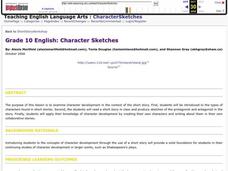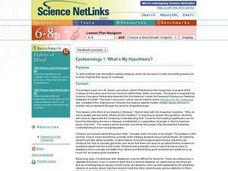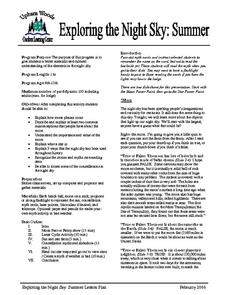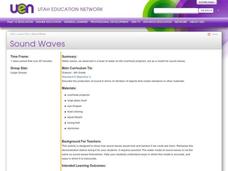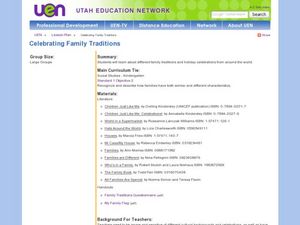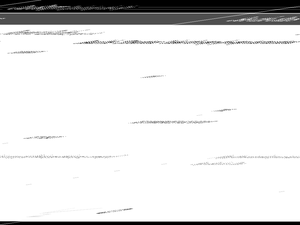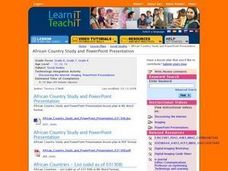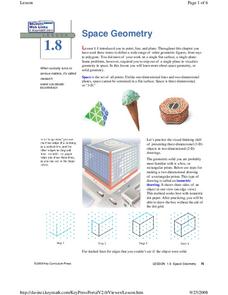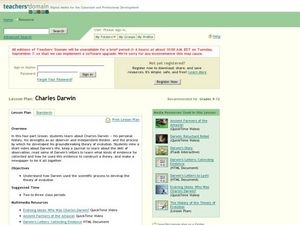Curated OER
Character Sketches
Learners are introduced to the types of characters found in short stories. They read a short story in class and produce sketches of the protagonist and antagonist. Finally, they create their own characters and write about them in their...
Curated OER
Being the Boss: Entrepreneurship
Young scholars describe the meaning of entrepreneurship and list three characteristics of entrepreneurship. They discuss the disadvantages and advantages of being an entrepreneur. They identify potential entrepreneurship opportunities in...
Curated OER
"The Party"
Students are introduced to the world of drama and explore and discuss the prospect of being an "outsider." They are encouraged to look into another person's experiences with drama. Each group of students act out short scenes to be...
Curated OER
Native American Tribes
Have your class learn about Native American tribes in California. They identify five regions where Native Americans lived, discuss the daily life of these people, and conduct research on a particular tribe. Afterward, they create a...
Macmillan Education
Life Skills Worksheet
Big and beautiful, this colorful poster encourages class members to establish specific learning goals before beginning activities and exercises.
Curated OER
Sports Personalities in Advertising
During a series of four activities, class members examine and deconstruct advertising that features famous athletes. They determine target audiences, analyze ads, explore "emotional climate," and role play a meeting between a sports...
Curated OER
Epidemiology 1: What's My Hypothesis?
Students demonstrate how descriptive epidemiological clues can be used to make educated guesses as to what might be the cause of a disease.
Curated OER
Look At Those Leaves!
Students observe leaves and their attributes and group them accordingly. In this science observation lesson students gather leaves and use them to become more familiar with seasonal changes and the cycles of our environment.
Curated OER
Exploring the Night Sky: Summer
Students explain how moon phases occur. They describe and explain at least two common misconceptions that people have about the moon. Students explain what a star is. They explain 3 ways that the night sky has been used throughout history.
Curated OER
Get a Job.....Build a Battery!
Students design and construct a battery (electrochemical cell). They works in a team to design and construct a working battery and is responsible for a labeled diagram of its operation. This engaging lesson stimulate their creative juices!
Curated OER
Jefferson's Blood
Students view the video "Jefferson's Blood" and complete a series of activities, dealing with both Thomas Jefferson's public and private life, in order to better explain Jefferson as a man and politician.
Curated OER
Building a Model Courtroom
Students construct a model of the Supreme Court's courtroom. They design the courtroom in such a way so that the architecture and furnishings in the courtroom represent the neutrality and power of the court.
Curated OER
Sound Waves
Students observe how sound waves would look and behave if we could see them. They determine ways the model is accurate and inaccurate based on actual sound waves.
Curated OER
Highlights of Modern American Family Art and Literature
Learners develop imagery in literary and art works. They discuss Jacob Lawrence's painting, the "Tombstones, 1942", which conveyed overcrowded tenements and families living in Harlem (New York, New York). They design picture stories...
Curated OER
We Like to Imagine - Animals
Students describe a pretend animal. They read "The After School Monster." Students read other books and discuss whether or not the characters are real. Students make a drawing of a pretend animal and of a real animal. They make up a...
Curated OER
Heroes and Heroines: King David, Julius Caesar, Cleopatra and Napoleon
Students identify and examine four heroes from history and imaginative literature. They discuss the characteristics of a hero and share perceptions of what makes a hero. By comparing and analyzing a few historical and literary figures,...
Curated OER
Families: Are they all the same?
Students recognize different types of families through literature. In this families lesson, students understand that all families have similarities and differences. Students complete a worksheet about the traditions in their family and a...
Curated OER
Reading Comprehension Assessment
In this reading assessment instructional activity, students complete a 42 question, four story passages test. Students read about Stephen Spielberg, Lois Lowry, a shy boy in high school, and Haleakala volcano. Students answer the...
Curated OER
Food Webs in the Barnegat Bay
Students investigate the food webs in the Barnegat Bay. For this organisms lesson, students use a graphic organizer to illustrate the types of consumers in the bay. Students use reference books to continue to research the animals found...
Curated OER
See the Stars
Young scholars explore the nighttime sky. In this space science lesson, students read the book Maria's Comet and and investigate the sky using their naked eyes. Young scholars compare the view of their naked eyes to the view of a telescope.
Curated OER
African Country Study and PowerPoint Presentation
Students investigate the geography of Africa. In this African culture lesson, students research the lifestyles of African residents and create a PowerPoint presentation based on a single African country. Students share their...
Curated OER
Space Geometry
Students explore points, lines and planes as it relates to geometry. In this geometry lesson, students analyze space and explain wy it is 3-D and not flat or 2-D. They solve problems involving volume and 3-D shapes.
Curated OER
Le Père Goriot by Honoré de Balzac
For this literature worksheet, students respond to 25 short answer and essay questions about Le Pere Goriot. Students may also link to an online interactive quiz on the novel at the bottom of the page.
Curated OER
Charles Darwin
Students research Charles Darwin and the process he used to develop his theory of evolution. They keep a journal about the skill of observation and make a newspaper of their learning.
